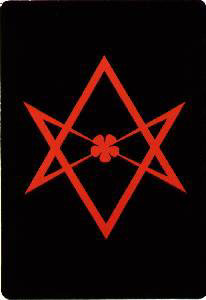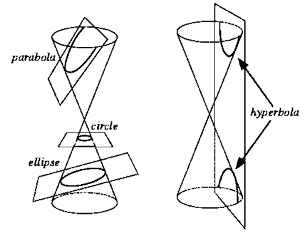|
|
I do NOT mean to say that this is what Crowley necessarily used the hexagram
for. This will just give you something to think about. This writing turns Crowley's unicursal hexagram into a very sublime Dark Tradition
glyph. When Crowley introduces the unicursal hexagram in his Book of Thoth
he writes: "The lines, however, are strictly Euclidean; they have no
depth." Why this notion, this protest of his? Is
it possible that he wants to make the reader aware of its space-bending properties? The
ritual wherein he makes use of it is Reguli (He also uses the "averse"
pentagram in it). In the commentary he writes: "...for the True
Will has no goal, its nature being To Go. Similarly, a parabola is bound by one
law which fixes its relation to two lines at every point; yet it has no end short
of infinity, and it constantly changes its direction." And: "Perhaps he may come at long last, leaping beyond the limits of his own
law, to conceive of that sublimely stupendous outrage to Reason, the Cone! Utterly
inscrutable to him, he is yet aware that he exists in the nature thereof, that
he is necessary thereto, that he is ordered thereby, and that therefrom he is
sprung, from the loins of so fearful a Father." The hyperbolas second focus has wandered around the universe and come back
where it left. I stretches into infinity and arrives behind itself. To infinity
and back again. This is like the push/pull idea, and like the way kundalini
travels. In Liber VII chapter V, verse 35, Crowley writes: "The
cone is cut with an infinite ray; the curve of hyperbolic life springs into being." A vibration thrills through Darkness? The unicursal hexagram would then
be a glyph of this Light stretching in and out of Darkness/Infinity. Crowley calls
his creation the hexagram of the Beast. What Beast? I say it is the natural man
(symbolized by the number 6: hence the hexagram); he with a living Flame. The
number 6 (the hexagram) could also be seen as representing Kronos, but the meaning
would be the same; the Beast is he who flows through Time. The lines would
be the Electro Magnetism, or the Elektros Diastasis-Phos part of it (the symbol
actually looks a bit like to two EM symbols reflecting each other) and the depth
of the symbol would be the Mychos part. If drawn inside a circle this would symbolize
Kyklos. The point inside the unicursal hexagram looks like a 5-petalled
flower, might it be a rose? (pictogram for Eros). 
